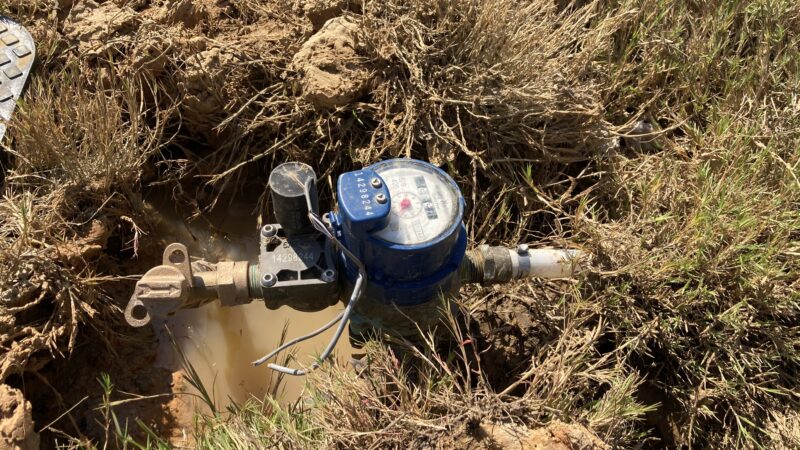Q&A: A bad deal made Jackson’s water problems worse. It wasn’t the only Mississippi city harmed
In this file photo, a water meter sits in the front yard of a home in Byram, Mississippi. JXN Water, the water utility in neighboring Jackson, serves Byram.
Smart water meters often get pitched as the solution to a city’s water problems. They’re more accurate, detect expensive water leaks early and can provide savings for cash-strapped utilities because fewer workers are needed to keep track of them.
This, however, wasn’t the experience Jackson, Mississippi, had with its first attempt to implement the technology. In 2013, tech company Siemens sold Jackson smart water meters that only made the city’s water problems worse. The meters failed to generate any bills for some people’s homes and sent other customers extraordinarily high bills.
The city settled a lawsuit with Siemens in 2020. Officials estimated that the meters cost Jackson $450 million.
But they weren’t the only municipality that suffered this fate.
Reporter Sarah Fowler investigated the Siemens deal for the New York Times and found at least eight Mississippi cities were harmed by faulty water meters and the companies peddling them.
Gulf States Newsroom senior reporter Stephan Bisaha spoke with Fowler to discuss her investigation.
The following conversation has been edited and condensed for clarity.
Before we get into the details about what happened with these cities, we should lay out the stakes here, because faulty water meters don’t sound like a big deal. But Jackson alone estimates these meters cost it about $450 million. How do water meters cause so much trouble?
When your water meters don’t work and you’re not able to send bills, water is still flowing even if you’re not able to charge people for them. So, when you’re not able to collect those bills because the bills weren’t accurate, the number keeps ringing up and keeps ringing.
It’s like a cash register. It just keeps going and keeps going. The $450 million is not just the price of the contract, but it’s all of it together. When you can’t accurately bill, then your debt increases, and a whole host of problems arise from that.
Now, the problems with Siemens have been talked about before, but always in the context of this deal with Jackson, Mississippi. You found that there were a bunch of other cities that also had problems with Siemens, like McComb, a small city about 80 miles south of Jackson. What happened there?
McComb was actually the first city that we found that signed a deal with Siemens. They’re a town of about 12,000 people. The meters, at the very beginning, had problems with the installation. According to the mayor, the meters were put in backward.
There was one in front of the mayor’s house. It was a box in the ground, and when I went last June, there was still a hole in the top of the box where the antenna was supposed to go. A hole had been drilled, but the antenna was never installed. You have to have the antenna in order to enable this drive-by technology.
And that’s where some of the savings come in for the city. Instead of having people manually going and checking — getting out of the truck, and writing it down, and then getting back in the truck — they can just drive by the meter and it’s supposed to log because of that antenna. When that antenna was not installed, that obviously slowed the process down.
So basically, these water meters did not work as promised in McComb and it cost the city a ton of money. And despite all that, Jackson got into its own deal with Siemens in 2013. Considering all that went wrong in McComb, how did this deal not get squashed?
So, the mayor of McComb said to me that he actually called a member of the [Jackson] city council and told them to run. He said that no one ever called him back on that, but there didn’t seem to be a lot of questions that were asked at the time.
What you have to remember, too, is that Jackson was in a desperate situation. They felt like their back was against the wall. They were hemorrhaging money, and they needed to have their bills paid like they needed the water to work. They needed to be able to bill people properly, and people able to pay those bills. They needed this revenue stream coming in.
What really struck me about your investigation was, again, when I hear about the Siemens deal, it’s always in the frame of Jackson. It seemed like a Jackson-only problem. But you went through and you found that there were more cities that had these issues and had their own bad deals with Siemens.
If you think about it, who knows about water meters, right? If you had told me a year ago that I would know the ins and outs of water meters, I mean, come on. But this is what I’ve been doing — so I can have a conversation about it. Most people on a city council, they’re busy with balancing budgets or dealing with personnel on a school board or things of that nature. They’re not focused on the day-to-day of how your water department works.
So when you have someone who claims to be an expert in their field coming and saying, ‘Hey, this is how we can accurately measure your water, save you money, and make you money and you don’t have to pay for it,’ they were saying that these meters would pay for themselves. That sounds like a great idea.
But it wasn’t just Siemens — and I think that’s what’s important — it wasn’t just Siemens that was going around and doing this to cities across Mississippi. There were multiple companies that went through and sold meters that didn’t do what they promised.
What could these cities or the state of Mississippi have done to prevent this?
I don’t know what the cities could have done. I wasn’t in that position.
But I will say all of these projects went through the Mississippi Development Authority. And Cleveland, Mississippi in particular, reached out to the Mississippi Development Authority and told them that they were hemorrhaging money and that they could not afford to go on the way that they were.
The attorney for the city of Cleveland said that they never heard back from anyone at MDA. So, MDA knew that this was happening, and yet it continued.
This story was produced by the Gulf States Newsroom, a collaboration between Mississippi Public Broadcasting, WBHM in Alabama, WWNO and WRKF in Louisiana and NPR.
Danish military evacuates US submariner who needed urgent medical care off Greenland
Denmark's military says its arctic command forces evacuated a crew member of a U.S. submarine off the coast of Greenland for urgent medical treatment.
Only a fraction of House seats are competitive. Redistricting is driving that lower
Primary voters in a small number of districts play an outsized role in deciding who wins Congress. The Trump-initiated mid-decade redistricting is driving that number of competitive seats even lower.
Homeland Security suspends TSA PreCheck and Global Entry airport security programs
The U.S. Department of Homeland Security is suspending the TSA PreCheck and Global Entry airport security programs as a partial government shutdown continues.
FCC calls for more ‘patriotic, pro-America’ programming in runup to 250th anniversary
The "Pledge America Campaign" urges broadcasters to focus on programming that highlights "the historic accomplishments of this great nation from our founding through the Trump Administration today."
NASA’s Artemis II lunar mission may not launch in March after all
NASA says an "interrupted flow" of helium to the rocket system could require a rollback to the Vehicle Assembly Building. If it happens, NASA says the launch to the moon would be delayed until April.
Mississippi health system shuts down clinics statewide after ransomware attack
The attack was launched on Thursday and prompted hospital officials to close all of its 35 clinics across the state.







